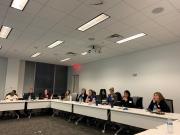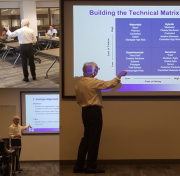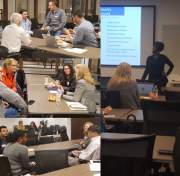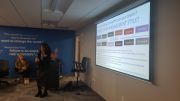Written By Lakisia Jones, PMP
Overview 
On May 18th, the PMI Agile forum presented “Stop Starting, Start Finishing!” by Karen Powell and Douglas Boling. Karen began the presentation by showing two slides of traffic. In the first slide, traffic was flowing smoothly. In the next slide traffic was jammed and at a complete stop. The traffic slides depict what can happen to a project. One day your project is running smoothly. Then suddenly, the project falls behind or may be halted altogether. This is where Kanban can help.
Kanban is not a software development lifecycle methodology, but it can be used to enhance the project management method already in use. Implementing Kanban starts with what you do now. Then identify current  processes, existing roles and responsibilities, and job titles. From that foundation, gain agreement to pursue improvement through evolutionary change and encourage acts of leadership at all levels.
processes, existing roles and responsibilities, and job titles. From that foundation, gain agreement to pursue improvement through evolutionary change and encourage acts of leadership at all levels.
Kanban principles include visualizing with a Kanban board, limiting work in progress, managing flow, making policies explicit, implementing feedback loops, improving collaboratively and evolving experimentally. By using Kanban boards, team members can clearly determine work ready to start, work in progress, and work that has been completed. Limiting work-in-progress promotes finishing and improves quality. It also signals when capacity is available. Tracking the date work started and date work completed, enables you to apply metrics that answers when an item will be done, how many can you get done, and how long it will take to complete a certain number of items.
Takeaways
• Why Kanban? Kanban provides relief from overburdening, better quality, and customer satisfaction. It allows you to focus so you can deliver better quality and builds trust within your organization.
• Kanban starts with what you do now, allows you to visualize work and limit work in progress to enable flow.
Next Event
Join us at the next PMI Atlanta Agile forum on June 16, 2020
Keynote Presentation: "Put the Fantastic back in Facilitation" presented by Kate Megaw, President of The Braintrust Consulting Group
Register at www.pmiatlanta.org/events/event-calendar
About PMI
Atlanta Chapter serves Project Management Community in Metro Atlanta, and we're an active resource to corporations, community and government agencies throughout north Georgia. With over 5,000 members, PMI Atlanta is among the top 5 chapters in the world. Our professional expertise span across industries; we’re the professionals building healthcare information technology systems, the engineers developing smarter public transportation, and the planners growing our communities more efficiently.






